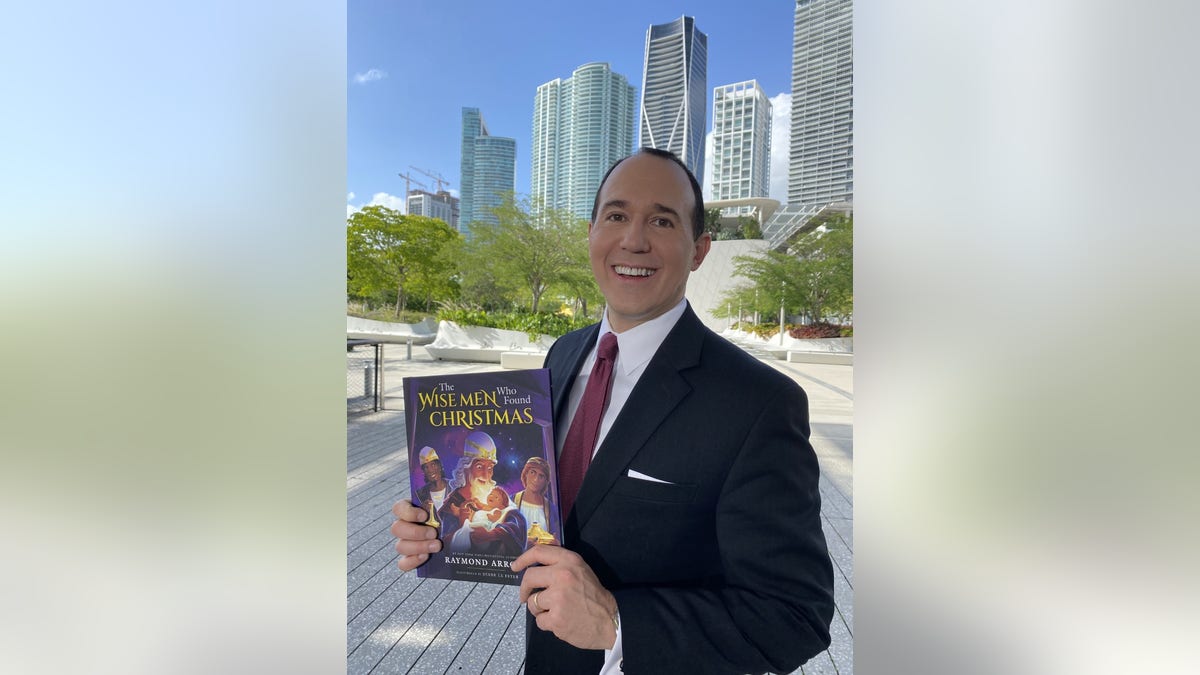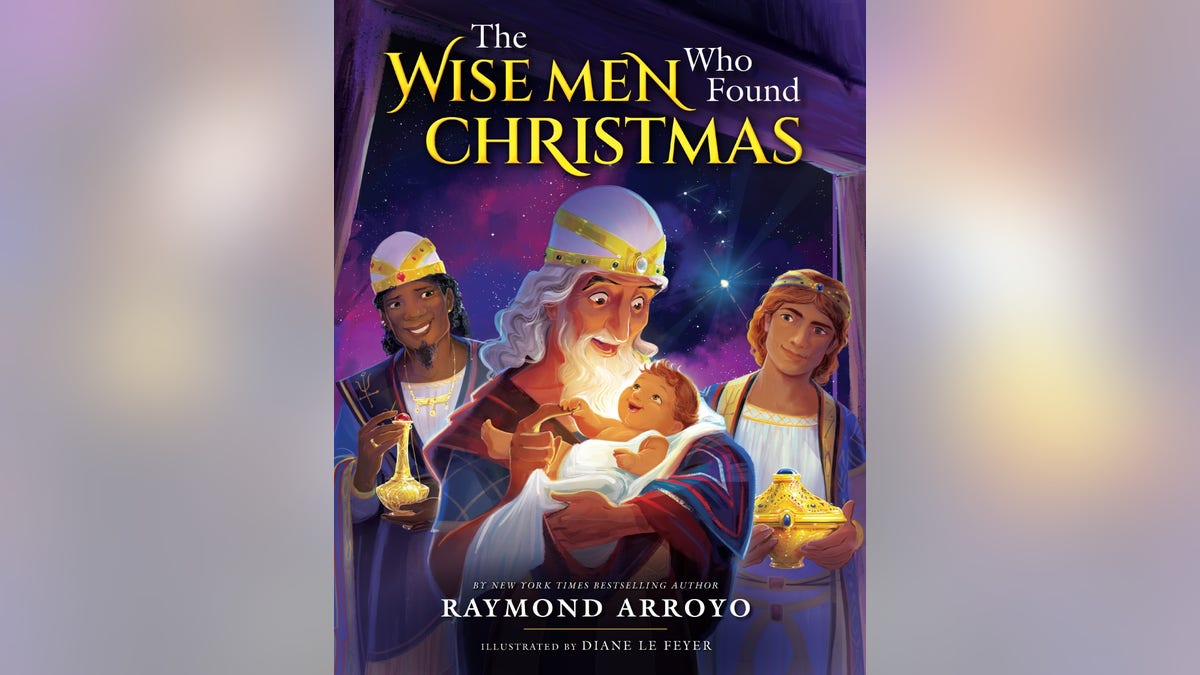Raymond Arroyo hosts 'The Wise Men Who Found Christmas'
'The Wise Men Who Found Christmas' is available now on Fox Nation.
Like so many other people all over the world, "we encounter these Wise Men every Christmas," said bestselling author Raymond Arroyo, a Fox News contributor and author of the new book, "The Wise Men Who Found Christmas" (Sophia Institute Press).
We either see them "at local Christmas pageants," he said. "Or they're under Christmas trees, or they're in store windows, or they're in front of churches."
The Wise Men "always seem to crop up," he said in an interview with Fox News Digital.
One study years ago apparently even found that, after the Virgin Mary, the Wise Men were the next most popular figures at Christmastime. "They even topped Santa Claus internationally," he said.
Which makes sense, he added, because "in South America, in the Hispanic community, they have the Three Kings' Day, which is a huge deal." The event concludes the 12 days of Christmas within Hispanic culture.

Author Raymond Arroyo with a copy of his book, "The Wise Men Who Found Christmas," recently published by Sophia Institute Press. As he researched the Wise Men, "I just became more fascinated," he told Fox News Digital in an interview. He wanted to bring the historic reality alive for readers. (Raymond Arroyo)
It's "our Feast of the Epiphany," added Arroyo. "It's the original January 6th."
This is the day, he said, "that we celebrate the Wise Men coming to see the Christ Child."
So "the Wise Men are a very big deal everywhere but the United States, although they're still pretty ubiquitous here."
He wanted to "get families to focus on the historic reality of these Wise Men because if they're real — then the One they sought is also just as real."
"And we see them, yet we know so little of them," he noted. "The gospel only mentions three gifts, not three Wise Men — so right off the bat, we have a problem with reality."
As he dug in and did research in preparation for his book and "figured out who these guys really were, I just became more fascinated," he said.
Arroyo pointed out the significance of the historical setting.
"Once you figure from first-century sources that these Wise Men came from Arabia, the only major kingdom that could have provided these commodities and afforded them the access to Judea would have been the kingdom of Nabatea, which is where they very likely hailed from."

Arroyo consulted with many experts as he prepared to write his new book. "What they [the Wise Men] did is even more adventurous and more amazing," he said, once readers realize the historic reality of the time. (Sophia Institute Press)
He consulted with experts, including first-century scholars, ancient world scholars and biblical theologians, he said, always with the intention of being able to help "families to focus on the historic reality of these Wise Men — because if they're real, then the One they sought is also just as real."
The Magi have always carried a sense of drama and wonder with them as part of their story, said Arroyo — "you know, following the star. It's romantic. It's adventurous. And when you root it in the historic reality in the context of the time, what they did is even more adventurous and more amazing."
Added Arroyo, "I think they risked their lives by going to Herod. This was a murderous king who killed three of his sons and a wife. But they had to go to him because they were part of a royal delegation."
And so, "the gospel ends up being more true. These were all oral accounts, passed on from generation to generation. So they only keep the good bits. They edit out all the rest."
And "why did this little tale of the Wise Men, and the prophecies, and the star, and finding the Christ Child — why was this important? That's basically what I wrestled with and wanted to uncover and see if history taught us anything."
"Families are yearning for the truth. It elevates the story and grounds their faith in something that is real." — Raymond Arroyo
Of enormous satisfaction to him now is this: "Families are making this part of their Christmas. Families are yearning for the truth. It elevates the story and grounds their faith in something that is real."
He added, "And I think that's important to families today," at a time "when there are so many distractions."

Particularly at Christmastime, Arroyo said, "there are so few moments when we come together — with our children, with our grandchildren, that I thought, I really want to instigate a conversation about history, values and memories." (iStock)
Arroyo said he felt the best way to share this story was in a way that pitched it "to the entire family — to be enjoyed by the whole family."
He added, "I write for families — for the young and for the young at heart."
Particularly at Christmastime, he said, "there are so few moments when we come together — with our children, with our grandchildren, that I thought, I really want to instigate a conversation about history, values and memories. And the only way to do that is to get everybody around a shared story."
Arroyo also said that he "chase[s] stories that I feel passionate about. And like the Wise Men — they taught me things."

Christmas manger scene with figurines including Jesus, Mary and Joseph — as well as the Wise Men. These Wise Men "were obedient to the truth," said bestselling author Raymond Arroyo. "They pursued it wherever it led." (iStock)
"This Christmas, they taught me: You have to keep your gaze above the horizon at all times. We focus so often on things of the earth, on things that are not going right, on planning for the future. You have to adjust your gaze upward a bit."
BIBLE VERSE OF THE DAY: WE MUST TRUST IN GOD, ‘NOT THE THINGS OF THIS WORLD,’ SAYS FAITH LEADER
And "these guys were always waiting for that sign," he said.
"They may have been descendants who waited 700 years for this sign to show up. They knew the story. They knew what to look for. They didn't see it — but they kept looking."
"I like to root people in a reality of the past that speaks to their future."
And then, "once they saw that light," he said of the Wise Men, "once they saw that star break into the sky, they jumped on those Arabian horses and off they went. They were obedient to the truth. They pursued it wherever it led."
And that, added Arroyo, "is what I try to do in my work as well."
He said he enjoys "reviving things that are lost, and I like to root people in a reality of the past that speaks to their future. The history speaks to our future — and I think we forget history too often."
The new book, "The Wise Men Who Found Christmas," is available everywhere books are sold, including from Amazon.
CLICK HERE TO GET THE FOX NEWS APP
Arroyo's next series, by the way, is coming from HarperCollins/Zonderkidz in the spring, called "Turnabout Tales." The first book in the series will be out in March, called "The Unexpected Light of Thomas Alva Edison."
CLICK HERE TO SIGN UP FOR OUR LIFESTYLE NEWSLETTER
Families will learn "how small moments and events in one’s life can create a big change" — much as Edison’s own life did.











































